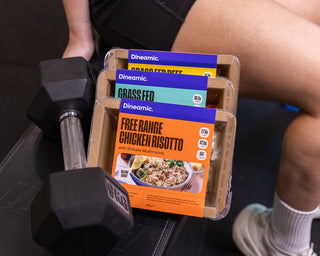
From celery juice detoxes to paleo diets, there’s over 1000 diet books available on the market right now all plastered with celebrity endorsements, anecdotal success stories and the promise of fast results. Fad diets come and go - they get recycled, re-branded into a provocative new name and next thing you know it’s the hot topic at your yoga studio.
Read our past blog – What you need to know about Keto
If you are a self-confessed serial dieter, you’re not alone. But before you even think about starting your next cleanse, detox, teatox or whatever they’re called these days please know that yo-yo dieting can be detrimental to your physical and psychological health and wellbeing. Statistically, nearly half of your lost weight will be regained after one year.
In fact, a 5-10% loss post diet is deemed a success if that even happens, and you can be at risk of nutritional deficiencies just for starters. To help educate you on all thing’s fad diets, we’re here to show you how to spot one a mile off by looking at what makes a fad diet a fad diet.
HOW TO SPOT A FAD DIET
IT CUTS OUT OR HEAVILY RESTRICTS A FOOD GROUP
Unless you’re cutting out a certain ingredient or food group due to an allergy or special health condition, cutting out entire food groups is not recommended. Although tempting as it may sound and relatively ‘easy’ to follow, the initial weight lost is usually lean muscle mass and water loss not actually the desired fat loss. For example, carbohydrate restricted diets are ultimately kilojoule restricted as well, when the body consumes energy, the main source, glycogen (storage unit of carbohydrates) found in muscles and in your liver is used up but it is also bound to water which is simultaneously lost giving the illusion of surplus weight loss. This can be harmful as it is a lot harder to regain lost muscle mass, but it is also easier to regain fat mass post-dieting. Instead, we should be incorporating and focusing on all food groups instead of singling out one. There’s also a reason most, if not all, government nutritional guidelines recommend a balanced consumption of the main food groups in your diet. By cutting out just one you are at risk of micronutrient and macronutrient deficiencies namely calcium, fibre, iodine, vitamin B7 and E.
IT USES SENSATIONAL LANGUAGE TO LURE YOU IN
Okay, so if any of these words are mentioned, cue the alarm sounds and run for the hills.
“Fat blasting, detox, toxins, metabolism boosting, target fat loss, fat shrinking, fat burner, Lose x amount of weight in 30 days!”. This type of language relies on informal language to exaggerate and dramatize the tone of the story evoking your emotions and drawing your attention to it. Basically, its designed to make you have an emotional response and get you excited.
Make May the Month to Raise Awareness of International No Diet Day
IT PROMISES QUICK RESULTS
Many, if not all fad diets promise quick results. However, a systematic review found that at 6 months, peak weight loss is achieved anything thereafter results tend to reverse themselves especially if motivation is lost and constant reinforcement is not available. Defining successful weight loss is also tricky as there is no universally agreed upon definition however, Wing and Hill define it as ‘individuals who have intentionally lost at least 10% of their weight and kept it off for a year’. If that equals success, then the 10 day weight loss promise is a bit of a stretch.
ITS BASED ON LACKLUSTRE SCIENTIFIC EVIDENCE
Most diets you see around are based on anecdotes and overzealous testimonials with technical terms that makes it sound like it will work. Others can be based on animal studies, on small population sample sizes, lack studies that indicate any long-term effects or show no repeatability. Despite what you do see though we tend to hold these in high regards because our brains are biased towards evidence that supports the cause (what we call a correlation bias). Then there’s the banger, most success stories find a correlation not a causation and, in other cases, some can even be sponsored by a company endorsing the product.
SOMEONE IS GETTING RICH AND ITS PROBABLY NOT YOU
So, the diet requires a, b and c and you can’t eat x, y and z. Sound familiar and incredibly exhausting? Some diets can be so convoluted that it’s easier to just buy a meal plan, specially prepared food, a miracle detox tea or magic supplement. In the process however, it’s costing you extra dollar bills and someone other than you is getting a whole lot richer. It’s no wonder that the weight loss industry alone racks up $600 million a year.
CONCLUSION
Diets can be painfully tempting with their promise of quick results. However sensible, practical and sustainable healthy eating behaviours is best and can be established through the expert advice of an Accredited Practicing Dietitian. Remember there is no one-size-fits all approach and if any of the above relates even remotely to the diet you’re on you probably need to give it another thought. Try a balanced diet with healthy portion sizes, combined with exercise & you’ll be on the right track.
To find an Accredited Practicing Dietitian near you, contact the Dietitian’s Association of Australia on 1800 812 942 or visit www.daa.asn.au.










